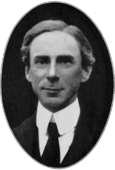Portal:Logic
|
| Article · Category · List · Outline · WikiProject |
Logic
Logic (from Classical Greek λόγος logos; meaning 'speech/word') is the study of the principles and criteria of valid inference and demonstration. The term "logos" was also believed by the Greeks to be the universal power by which all reality was sustained and made coherent and consistent.
As a formal science, logic investigates and classifies the structure of statements and arguments, both through the study of formal systems of inference and through the study of arguments in natural language. The field of logic ranges from core topics such as the study of fallacies and paradoxes, to specialized analysis of reasoning using probability and to arguments involving causality. Logic is also commonly used today in argumentation theory. [1]
Traditionally, logic is studied as a branch of philosophy, one part of the classical trivium, which consisted of grammar, logic, and rhetoric. Since the mid-nineteenth century formal logic has been studied in the context of the foundations of mathematics. In 1910 Bertrand Russell and Alfred North Whitehead attempted to establish logic as the cornerstone of mathematics formally with the publication of Principia Mathematica. However, the system of Principia is no longer much used, having been largely supplanted by set theory. The development of formal logic and its implementation in computing machinery is the foundation of computer science.
Selected article
Selected biography
A prolific writer, he was also a populariser of philosophy and a commentator on a large variety of topics, ranging from very serious issues to those much less so. Continuing a family tradition in political affairs, he was a prominent anti-war activist, championing free trade between nations and anti-imperialism.
Did you know?
- ...that the Law of noncontradiction is the same as the Law of contradiction?
- ...that NAND alone or NOR alone make a functionally complete set of logical operators?
- ...that according to the continuum hypothesis, there is no cardinal number in between aleph null and the cardinality of the continuum?
- ...that all 24 valid syllogistic forms have names like 'Camestros' and 'Felapton'?
- ...that if a statement P implies another statement Q, and a third statement R also implies Q, and either P or R is true; then Q has to be true?
- ...that the dunce cap was named after a logician?
- ...that the collective noun for a group of logicians is a "sequitur of logicians"
Categories
Topics
Related portals
WikiProjects
Things to do
References
- ^ J. Robert Cox and Charles Arthur Willard, eds. Advances in Argumentation Theory and Research, Southern Illinois University Press, 1983 ISBN 0809310503, ISBN-13 978-0809310500
- ^ Godel, Escher, Bach: An Eternal Golden Braid, Douglas Hofstadter
- ^ Because non-well-formed formulas are rarely considered, some authors ignore them altogether. For these authors, "formula" and "well-formed formula" are synonyms. Other authors use the term "formula" for any string of symbols in the language; certain of these strings are then singled out as the well-formed formulas.
- What are portals?
- List of portals
- Featured portals

![This diagram shows the syntactic entities which may be constructed from formal languages. The symbols and strings of symbols may be broadly divided into nonsense and well-formed formulas. A formal language can be thought of as identical to the set of its well-formed formulas. The set of well-formed formulas may be broadly divided into theorems and non-theorems. However, quite often, a formal system will simply define all of its well-formed formula as theorems.[2]](http://web.archive.org./web/20161110035203im_/https://upload.wikimedia.org/wikipedia/commons/thumb/d/da/Formal_languages.svg/150px-Formal_languages.svg.png)



